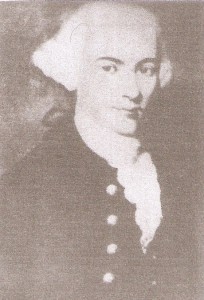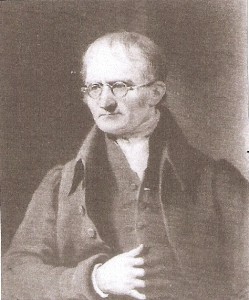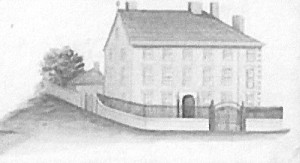The existence of the small number of dissenting academies made a lasting contribution to scientific and technical education particularly through their former students and tutors. They emphasised scientific and technological subjects which at the time were shunned by the established universities. The academies taught laypeople as well as those wishing to enter the church. The Academy founded in Warrington (1756-1786) is a good example of the movement the image above of the Academy is c 1762. The Academy was supported and funded by the newly affluent industrialists from Warrington and beyond who were disillusioned by the standard of education provided by Oxford and Cambridge Universities. The examinations and the resultant value of degrees from these two ancient universities were perceived as questionable. One of the few exceptions was the mathematics course at Cambridge which had tutored Newton. These business people sponsored the academies and wanted to see subjects introduced into the curriculum that would improve the effectiveness and efficiency of commercial and industrial practices and processes. As a result Warrington Academy offered such subjects as chemistry, electricity, logic, magnetism, mathematics, optics, pneumatics as well as the more traditional subjects such as ethics, philosophy and theology. The Academy taught just 400 students in its 29 years of existence and it was never financially secure. Only about 16% of the students studied theological subjects in order to enter the church. The Warrington Academy was finally dissolved in 1786 as a result of continuing financial problems and the hostility of religious bodies to new scientific ideas. However its influence continued to live on after its closure mainly through the subsequent achievements of its former students and tutors. These included Joseph Priestley tutor at Warrington Academy (1761), formally a student at the Daventry Academy (1752), an active member of the Lunar Society and noted chemist. Joseph Priestley was a non-conformist minister who had run a school in Nantwich for a number of years before being appointed to the Warrington Academy. He developed a considerable reputation as a scientist researching gases and electricity. Thomas Percival (one of the first students enrolled at Warrington Academy, founder with others of the Manchester Academy, founder of the Manchester Literary and Philosophical Society and a noted medical practitioner and researcher).

Fortunately with the support of Percival after its closure in 1786 its library, equipment and the money realised from the sale of its building greatly assisted the newly opened Manchester Academy. A portrait of Thomas Percival is shown opposite. The Manchester Academy was founded in 1786 and continued the tradition of dissent by teaching subjects other than theology. was appointed teacher of mathematics and natural philosophy in 1793 and remained there until the Academy was relocated to York in 1803.
When the academy was dissolved in 1786 393 students had been enrolled and these included Thomas Barnes, Thomas Malthus, Thomas Percival (see above), John Simpson and John Goodricke.
Other tutors at the Warrington Academy included: John Aikin, Reinhold Forster, William Enfield, George Walker, Gilbert Wakefield. John Taylor, Joseph Priestley (see above), Anna Barbauld and her brother John Aikin (children of John Aikin).
The first President was Henry Willoughby.
Jean Paul Marat was reputed to have been a tutor of French at the academy. A portrait of John Dalton is shown below.

References:
- P. O’Brien. ‘Warrington Academy 1757-86’ Owl Books ISBN 0 9514333 0X.
Broadhurst. E. M. ‘History of Collegiate Teaching some pioneers Thomas Percival’ Book of Manchester and Salford-Manchester Falkner and Co pages 30-33. 1929.
Schofield. R. E. ‘The Enlightenment of Joseph Priestley’. ISBN 978-0-271-02510-0. Penn State University Press. 1997.


Recent Comments